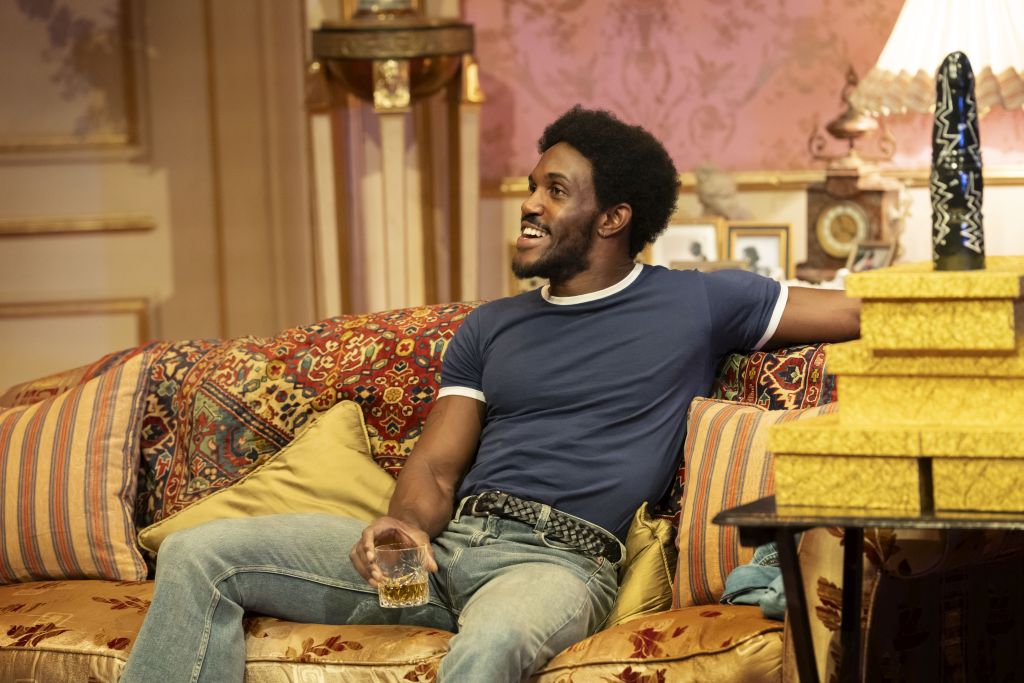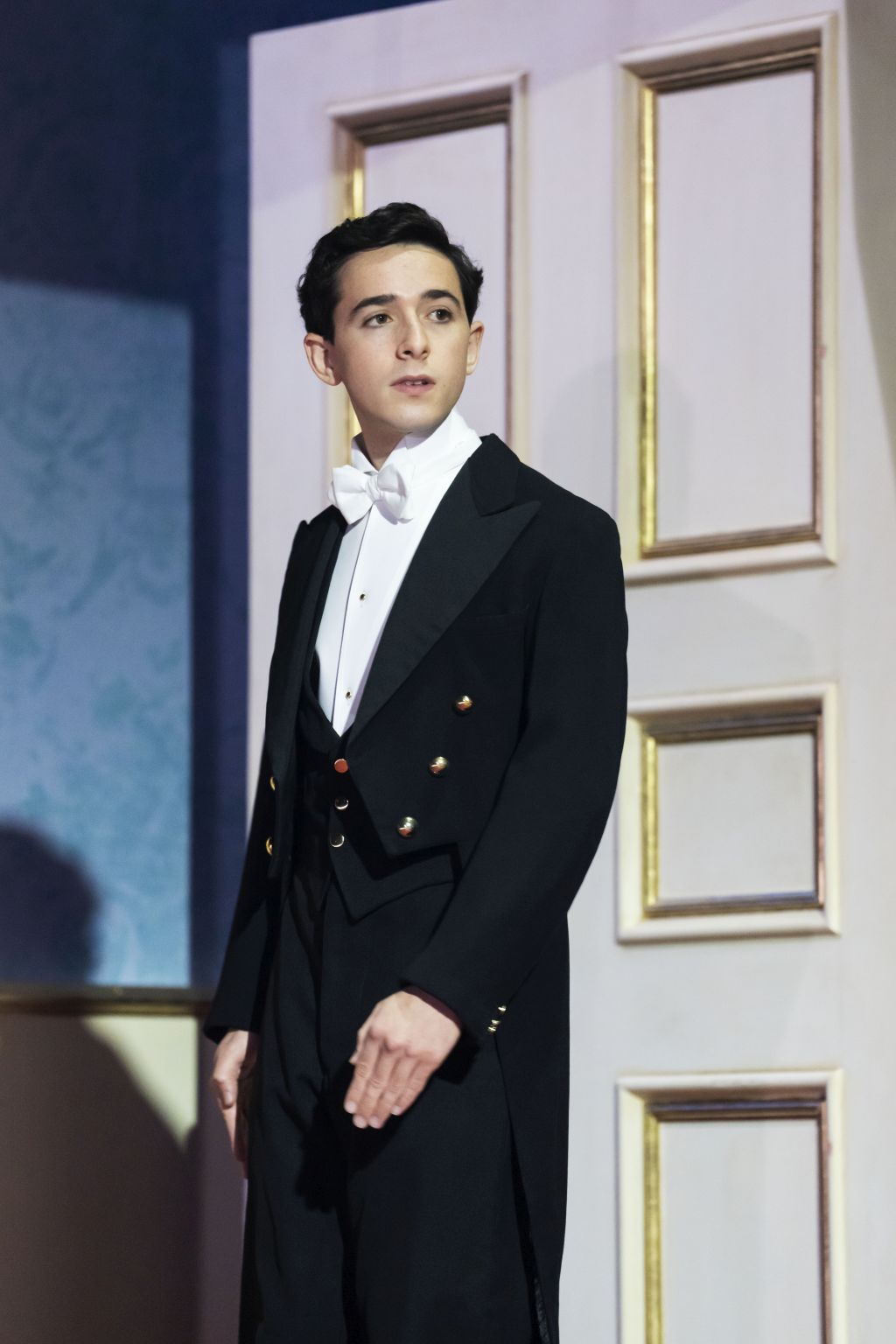Rarely has a play's opening been so opportune. Just when it looked as if the West End was slipping into decline, along comes the smart, shrewd Backstairs Billy to allay mounting fears of late that the commercial theatre had lost all sense of quality control. (The offending titles know who they are.)
It helps, of course, that Marcelo Dos Santos's royalty-themed play is getting a luxuriant production whose visual allure is evident from our first sight of designer Christopher Oram's spare-no-floral-arrangement recreation of the Garden Room of Clarence House. But just when you think you've heard enough about the House of Windsor across any number of imaginings (The Interview at the Park Theatre opened only last week), Backstairs Billy proffers the most unusual depiction of an unlikely duo since Judi Dench crossed wits with Billy Connolly in Mrs Brown: one can imagine this latest pairing making their own way with time to the screen.
The dynamic this time out, tracked across 25 years, is between the Queen Mother (Penelope Wilton, no stranger to grandeur from her time on Downton Abbey) and her butler-turned-confidant, William (Billy) Tallon (the splendid Luke Evans), who spent a half-century in royal employ.
Unabashedly gay within comparatively cloistered confines at obvious odds with the more volatile world outside, Billy is seen at a flashpoint in his unbridled, risk-taking life. Free to be his unfettered self within the safety of a royal residence, Billy preens his way about the palace/phallus (that's their wordplay, not mine), indulging in double entendres ("hung" gets a workout) and clearly delighting in the company of a world-renowned widow who is the first to admit to a loneliness that finds an antidote in Billy's company.
 Dos Santos has fun with the distinctive perspective offered by privilege: the Queen Mum wondering aloud what a leisure centre even means or announcing her willingness for a fry-up on the Brixton Road. Billy, for his part, allows the outside world in, bringing home a Black artist, Ian (the charismatic Eloka Ivo, pictured above), whose presence soon demands an explanation. This visitor's princely transformation - in name at least - prompts one of the heartier laughs of a production rife with comedy that, under Michael Grandage's astute directorial eye, can shift moods on a dime, and does. And it will be interesting when Jack Thorne's The Motive and the Cue moves in up the road, since that play, too, puts a random pick-up centre-stage.
Dos Santos has fun with the distinctive perspective offered by privilege: the Queen Mum wondering aloud what a leisure centre even means or announcing her willingness for a fry-up on the Brixton Road. Billy, for his part, allows the outside world in, bringing home a Black artist, Ian (the charismatic Eloka Ivo, pictured above), whose presence soon demands an explanation. This visitor's princely transformation - in name at least - prompts one of the heartier laughs of a production rife with comedy that, under Michael Grandage's astute directorial eye, can shift moods on a dime, and does. And it will be interesting when Jack Thorne's The Motive and the Cue moves in up the road, since that play, too, puts a random pick-up centre-stage.
Some may wonder whether a crucial prop (not to be revealed here) doesn't risk tilting events in the unexpected direction of the No Sex Please We're British-style romps that marked out the West End back in the day. But a stunning gear shift late on shows the price paid for transgression, even in the presence of a supposed soulmate. At that moment, and others, a production built on airiness and charm exerts a decisive chill.
We first meet the principals in 1979, which is to say some years before the Queen Mother and Billy died in 2002 and 2007, respectively. Thatcher is the name on people's lips, and change (some would say protest) is in the air, no matter how hermetically sealed Clarence House may seem.
It's Dos Santos's cunning to rewind the clock a quarter-century to show us the teenage Billy (a touching Ilan Galkoff, pictured below), a Coventry lad who wants nothing more than the life of service that came his way and which brings with it in time a subsequent new recruit, Gwydion (Iwan Davies), possessed of rather more guile than Billy presumably was at his age. A large cast finds such stage vets as Nicola Sloane and Michael Simkins doing unrecognisable double duty, and Emily Barber in especially ripe form as a libidinous aristo who is quite taken with this newly arrived Tooting resident, Ian, in her midst.
 The dialogue is arch as needed - people in this world are "quite good looking, from certain angles" and Brentford, the dowager queen tells us, "is a place, apparently". But strip away the Coward-isms and you also find an anatomy of cruelty when and where least expected, no matter how cute the two corgis, Pumpkin and Tring, who scamper in and out of view: one of them even does a spell on the Queen Mother's lap before quite literally being shown the door.
The dialogue is arch as needed - people in this world are "quite good looking, from certain angles" and Brentford, the dowager queen tells us, "is a place, apparently". But strip away the Coward-isms and you also find an anatomy of cruelty when and where least expected, no matter how cute the two corgis, Pumpkin and Tring, who scamper in and out of view: one of them even does a spell on the Queen Mother's lap before quite literally being shown the door.
The performances could not be better. I last saw Evans on this same stage in Rent Remixed, but nothing in my experience of him so far suggested the layers of feeling that he brings to this sleekly coiffed purveyor of bravado whose ego gets rather dramatically punctured. Time away from theatre may have made Evans a film name, but seems also to have amplified his connection to the stage.
Wilton returns often to the theatre and deserves credit for a portrait that is light on its feet, not least in the various scenes in which the Queen Mother and Billy come together to dance. (Note a fascinating programme interview between the costume designers about capturing the necessary sartorial look.) Entirely aware of "people like you" (that's to say, gay), the Queen Mother is all tolerance, but only up to a point. And those who might dismiss Backstairs Billy as so much heightened gossip would do well to heed its warning about societal divides that on this evidence can never be breached.
Dos Santos has a solo play opening imminently at the Bush, so will be getting an unusual double exposure for so young a writer. But there's no sense here of writing inflated beyond its station, to co-opt the language of the stratified realm this play inhabits. "Life is queer," Backstairs Billy tells us, which turns out to be true in more ways than one. That it can make for theatre by turns devastating and delicious is among its major achievements, too.















Add comment